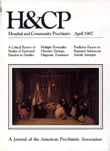The Failure of Routine Assessment to Detect Histories of Assault Experienced by Psychiatric Patients
Abstract
To test the hypothesis that patients' histories of having been physically or sexually assaulted are often not elicited in routine clinical assessments, the authors reviewed the charts of 100 inpatients for any mention of such experiences. The data were compared with results of earlier research interviews in which the same 100 patients were questioned directly about assault experiences. Comparison of the two sets of data showed that only 9 percent of the assault histories obtained during research interviews were mentioned on the patients' charts. Because of the clinical significance of most major assaults, the authors recommend that clinicians routinely inquire about assault history.
Access content
To read the fulltext, please use one of the options below to sign in or purchase access.- Personal login
- Institutional Login
- Sign in via OpenAthens
- Register for access
-
Please login/register if you wish to pair your device and check access availability.
Not a subscriber?
PsychiatryOnline subscription options offer access to the DSM-5 library, books, journals, CME, and patient resources. This all-in-one virtual library provides psychiatrists and mental health professionals with key resources for diagnosis, treatment, research, and professional development.
Need more help? PsychiatryOnline Customer Service may be reached by emailing [email protected] or by calling 800-368-5777 (in the U.S.) or 703-907-7322 (outside the U.S.).



